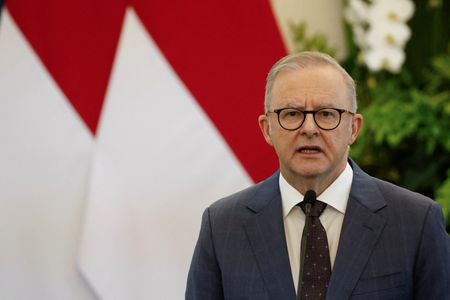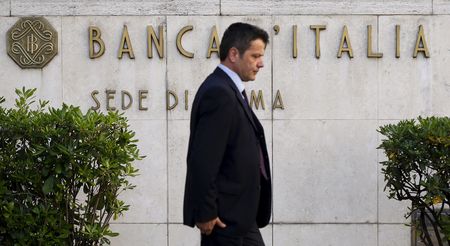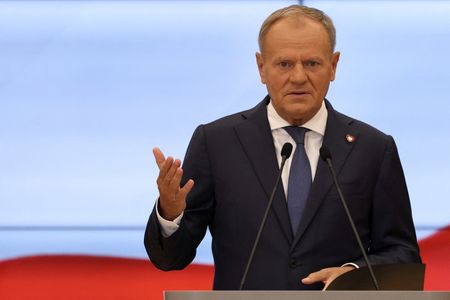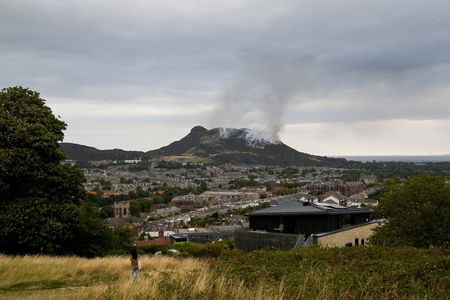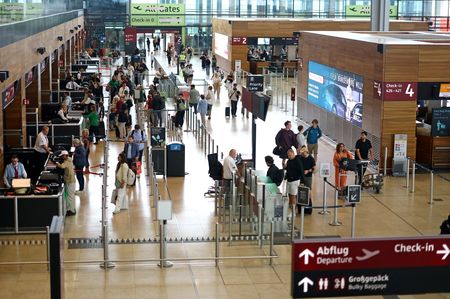By Kirsty Needham and Christine Chen
SYDNEY (Reuters) -Australia will recognise a Palestinian state at next month’s United Nations General Assembly, Prime Minister Anthony Albanese said on Monday, a move that adds to international pressure on Israel after similar announcements from France, Britain and Canada.
“Australia will recognise the State of Palestine at the 80th Sessions of the United Nations General Assembly in September, to contribute to international momentum towards a two-state solution, a ceasefire in Gaza and the release of hostages,” Albanese said in a statement.
Albanese told reporters in Canberra that recognition would be predicated on commitments Australia received from the Palestinian Authority, including that Islamist militant group Hamas would have no involvement in any future state.
“A two-state solution is humanity’s best hope to break the cycle of violence in the Middle East and to bring an end to the conflict, suffering and starvation in Gaza,” Albanese said at a press conference.
Albanese said he spoke with Israeli Prime Minister Benjamin Netanyahu on Thursday and told him a political solution was needed and not a military one.
Australia last week criticised Israel’s plan to take military control of Gaza, and Albanese said the decision to recognise a Palestinian state was “further compelled” by Netanyahu’s disregard of the international community’s calls and failure to comply with legal and ethical obligations in Gaza.
“The Netanyahu Government is extinguishing the prospect of a two-state solution by rapidly expanding illegal settlements, threatening annexation in the Occupied Palestinian Territories, and explicitly opposing any Palestinian state,” Albanese said in the joint statement with Foreign Minister Penny Wong.
Commitments by the Palestinian Authority to reform governance, demilitarise and hold general elections, as well as Arab League demands for Hamas to end its rule in Gaza, created an opportunity, he said.
“This is an opportunity to isolate Hamas,” he added.
Wong said she had informed U.S. Secretary of State Marco Rubio of Australia’s decision.
U.S. President Donald Trump last month criticised Canada’s decision to back Palestinian statehood and Rubio has said the decision by France was reckless.
Israel’s Ambassador to Australia, Amir Maimon, criticised Australia’s decision on social media platform X as undermining Israel’s security and derailing hostage negotiations.
Last month, Albanese would not publicly commit to a timeframe for recognition, and has previously been wary of divided public opinion in Australia over Gaza.
Tens of thousands of demonstrators marched across Sydney’s Harbour Bridge this month calling for aid deliveries in Gaza as the humanitarian crisis worsened.
Albanese said on Monday “massive concern” over the devastation in Gaza came not just from international leaders but community members.
Former Australian foreign minister Gareth Evans said it was “absolutely timely” for Australia to move on recognition.
“Australia joining the group of credible voices from the global North, acting now in coordinated harmony with Israel’s Arab neighbours, will help pile new pressure on Netanyahu to change the ever more indefensibly destructive – and self-destructive for Israel – course on which he seems set,” he said in comments to Reuters.
Australian National University international law professor Donald Rothwell said recognising a Palestinian state means Australia can provide aid support without having to go through the U.N. and other agencies, contribute to rebuilding Gaza and enter into legally binding treaties.
The Palestinian Authority’s state minister for foreign affairs, Varsen Aghabekian, said in an Australian Broadcasting Corporation interview it was a long-awaited decision that “gives Palestinians a sense of hope for the future”, although a ceasefire remains the priority.
New Zealand said it would consider its position on recognition of a Palestinian state this month.
Israel launched its assault on Gaza after Hamas-led fighters stormed Israeli towns near the border, killing some 1,200 people and capturing 251 hostages on October 7, 2023. Since then, Israeli forces have killed at least 60,000 people in Gaza, health officials there say, and reduced much of the enclave to ruins.
Malnutrition is widespread in the enclave due to what international aid agencies say is a deliberate plan by Israel to restrict aid. Israel rejects that allegation, blaming Hamas for the hunger among Palestinians and saying a lot of aid has been distributed.
(Reporting by Christine Chen and Kirsty Needham in Sydney; Editing by Christian Schmollinger, Stephen Coates, Lincoln Feast and Michael Perry)

